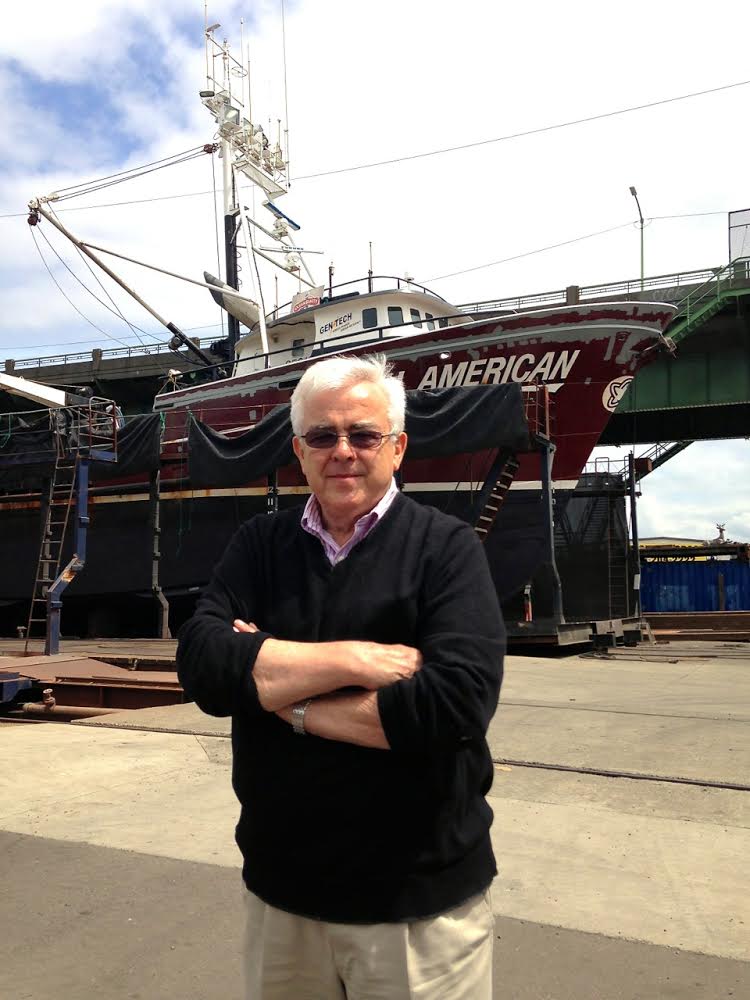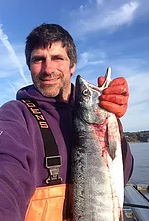FOR IMMEDIATE GENERAL RELEASE:
October 23, 2018
To whom it may concern:

Erling Skaar with his Bering Sea crab vessel the F/V North American. It’s outfitted with his GenTech system, allowing it to operate with far lower emissions and fuel costs than similar vessels.
We write today to announce our support for Washington’s Initiative 1631. As businesses who rely on healthy fisheries for a significant portion of our income, we believe this is a well-designed policy that offers us – and our customers – the best possible chance against an uncertain future fraught with the threats of changing ocean conditions.
It’s become clear that our fisheries need a lifeline. Here in Washington, we are experiencing the worst ocean acidification anywhere in the world. Research has firmly established the cause of this problem: emissions from burning coal, oil and gas mix into the ocean, altering its chemistry. The consequences loomed into headlines a decade ago when the oyster industry lost millions and nearly went out of business during the oyster seed crisis. Temporary and limited adaptation measures in hatcheries are keeping them in business, but in the rest of the oceans, fisheries that put dinner on billions of tables are at risk. Here in the Northwest, harvests are already being eroded and even shut down by the effects of unchecked carbon emissions.
The “warm blob,” an unprecedented marine heatwave off the West Coast, reached its height in 2015 and caused mass fatalities. In the Columbia River, a quarter million salmon died. The largest recorded toxic algae bloom shut down the Dungeness crab fishery for months. The food web crashed, and marine creatures were spotted farther north than ever before. Sea surface temperatures never returned to their previous norm, and new research indicates another blob is forming.
Summers have become synonymous with a smoky haze from wildfires causing poor visibility and poor health – this summer the National Weather Service warned even healthy adults in some Washington areas to stay indoors due to hazardous air quality. At the same time, our iconic Orca whales are starving from a lack of Chinook salmon. The Chinook in turn are suffering from a lack of the zooplankton that juveniles eat.
Research has made it clear that some of our most lucrative fisheries are vulnerable to ocean acidification: king crab, Dungeness crab, and salmon. Scientists also warm that combining stressors – like warming with ocean acidification – makes survival in the ocean all the more precarious.
We studied to understand how to protect our businesses and the natural resources we rely on. The answer was clear: reduce carbon emissions. Reduce them now, and reduce them as quickly as possible.
This is where I-1631 comes in. This fee on carbon, which starts at $15/ton and rises by $2/year, will raise around a billion dollars a year. That revenue will be spent on clean energy projects, energy efficiency, and climate resiliency. Fisheries and ocean acidification projects are specifically included as priority investments.
Maritime fuels will be exempt, so struggling fishing vessel operators won’t pay any additional cost for their fuel. However, they will still qualify for energy efficiency funding. Many of our businesses offer technologies that greatly increase efficiency: sometimes by more than 50%. But over and over, we hear from our customers that despite the obvious advantages and quick return on investment, they simply don’t have the capital to invest in energy efficiency. A billion dollars a year, every year, would provide unprecedented access to that sorely needed capital. Businesses and fleets of vessels or trucks would reap the savings in energy costs, and our environment would reap the benefits of lowered carbon emissions. It’s an obvious win-win.
The fee will likely add about $.14/gallon to the cost of diesel for road transportation, and other energy costs will rise a bit too. But the additional cost could be eliminated by just a 5% increase in efficiency in year one; even in year ten, a 14% increase in efficiency would more than pay the fee. Such efficiency gains are easily achievable with existing technology. Fleets of vessels could be outfitted with more efficient engines or generators, processing facilities could receive grants for more energy efficient refrigeration systems or boilers.
The initiative will also fund work to prevent and mitigate wildfires, flooding, and other extreme weather events, and research to understand the threats to fisheries and investigate mitigation methods.
And the truth is, we’re already paying much more for climate change than I-1631’s fee will cost. We don’t just pay in harvest closures, reduced catches, and lost jobs. We get stuck with an out-of-control tab for the impacts of carbon pollution through our taxes and insurance bills. Since 1980, the US economy has already endured climate disaster costs of more than $1.5 trillion, according to NOAA. That works out to nearly $10,000 for each individual taxpayer. And those costs are rising. In 2017, NOAA reckons that extreme weather disasters rang up a $306 billion bill in the US. That’s another $2,000 a year on each of us who do the work and pay the bills around here.
In Washington alone, the $1 billion in wildfire response cost since 2014 adds up to a cost of $371 per household. Enough already. I-1631 will combat these threats. Washington will join a global network of price-and-invest policies with a proven track record of improving economies, creating jobs, decreasing health costs, and dramatically reducing emissions. The initiative protects critical Washington industries that can’t afford an added fee, and ensures that low-income households bear no additional burden. It gives tribes and rural communities their due, and because it’s a fee rather than a tax, the funds can never be diverted for other uses: not for the general fund, not for pet projects. The revenue can only be used for emissions reductions and climate resiliency.
Along with a diverse coalition including labor, tribes, physicians, and environment and science experts, I-1631 is also supported by major Washington businesses. Vigor, Microsoft, Expedia, Virginia Mason, MacDonald Miller, and REI are just a handful of the biggest endorsers. We proudly add our names to theirs, and ask other businesses to join us.
For more information contact the Working Group on Seafood and Energy at info@globaloceanhealth.org.
Sincerely,
Erling Skaar
F/V North American and GenTech Global
Pete Knutson
Loki Fish Co
Matt Marinkovich
Matt’s Fresh Fish
Amy Grondin
Duna Fisheries
Greg Friedrichs
F/V Arminta
Mike Cassinelli
Beacon Charters
Lars Matthiesen
Highland Refrigeration
Bob Allen
MER Equipment
Larry Soriano
Alaska Ship Supply
Robert Loe
Robert Loe & Associates

 In the mid-1980s, when I started seining with my dad for Fraser River sockeye, the Puget Sound fishery was already declining. But lately the consequences of a fraying marine food web are spreading far beyond the fishing fleet. Living in Friday Harbor, I have a front row seat.
In the mid-1980s, when I started seining with my dad for Fraser River sockeye, the Puget Sound fishery was already declining. But lately the consequences of a fraying marine food web are spreading far beyond the fishing fleet. Living in Friday Harbor, I have a front row seat.